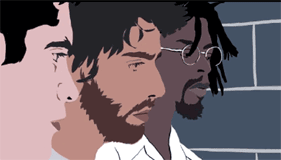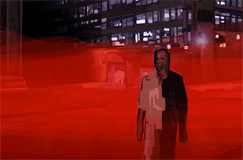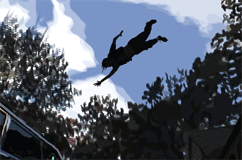Waking Life (Richard Linklater) 2001
 The first sequence in Richard Linklater's animated masterpiece Waking Life
shows a young boy as he begins to drift away. He grabs a car door handle,
anchoring himself to reality. Then the film reveals, for the first time, that
what we were seeing was a dream. But, how could it have been anything else?
The animation has a gently pulsating, dreamlike quality. The logic of the scene
didn't quite apply to reality. The film takes place entirely within a dream
(within a dream, within a dream...), but really doesn't try to even suggest
it's another reality we're looking at. The characters pontificate to the
narrator about a huge variety of subjects, but most of them seem preoccupied
with the "big questions", such as "what is free will?" or
"what is death?".
The first sequence in Richard Linklater's animated masterpiece Waking Life
shows a young boy as he begins to drift away. He grabs a car door handle,
anchoring himself to reality. Then the film reveals, for the first time, that
what we were seeing was a dream. But, how could it have been anything else?
The animation has a gently pulsating, dreamlike quality. The logic of the scene
didn't quite apply to reality. The film takes place entirely within a dream
(within a dream, within a dream...), but really doesn't try to even suggest
it's another reality we're looking at. The characters pontificate to the
narrator about a huge variety of subjects, but most of them seem preoccupied
with the "big questions", such as "what is free will?" or
"what is death?".
 What stands out in this film, and elevates it, is its incredible sense
of community. Wiley, our guide, visits with an entire cross-section of people,
listening to their theories. Sometimes, he isn't present as he we watch a
character ramble. The film is concerned with each opinion. Every one of
them is treated with a sense of respect. Whether it is the ramblings of a
madman, half-thought through hogwash, or a genuinely mind-blowing sermon, each
one is savored by the film. It's as if the act of trying to attain true
profundity is all that is asked for. The result is far less important than the
attempt. In the dream, the speakers' ideas are all made literal. Everyone
together seems to be questioning the unanswerables in the same way. The uniting
factor of humanity is a sense of yearning, says the film. The characters discuss
the current generation's knowledge as an amalgamation of all that has come
before, suggesting any sense of community that does not take in all of humanity
is incomplete. We all yearn to learn. The act of questioning seems to be more
important to the film than the answers. This film, which doesn't presume to
answer the questions it poses, doesn't dictate to the audience, but instead
generously gives the audience tools to further its cause. Watching the
film, we realize that each of us in the audience is a participant in the
procession. On a more literal level, almost every film in the community of
Linklater's films gets referenced here. The film features over forty actors that
play the characters that our lead interacts with. It was animated by over thirty
animators. The script is not so much the work of one man, but, rather, is
the amalgamation of many different philosophers' work. There's something
beautiful about this huge group of people collaborating as they attempt to wake
life through cinema. The film celebrates this community to a greater extent than
any narrative film I can think of.
What stands out in this film, and elevates it, is its incredible sense
of community. Wiley, our guide, visits with an entire cross-section of people,
listening to their theories. Sometimes, he isn't present as he we watch a
character ramble. The film is concerned with each opinion. Every one of
them is treated with a sense of respect. Whether it is the ramblings of a
madman, half-thought through hogwash, or a genuinely mind-blowing sermon, each
one is savored by the film. It's as if the act of trying to attain true
profundity is all that is asked for. The result is far less important than the
attempt. In the dream, the speakers' ideas are all made literal. Everyone
together seems to be questioning the unanswerables in the same way. The uniting
factor of humanity is a sense of yearning, says the film. The characters discuss
the current generation's knowledge as an amalgamation of all that has come
before, suggesting any sense of community that does not take in all of humanity
is incomplete. We all yearn to learn. The act of questioning seems to be more
important to the film than the answers. This film, which doesn't presume to
answer the questions it poses, doesn't dictate to the audience, but instead
generously gives the audience tools to further its cause. Watching the
film, we realize that each of us in the audience is a participant in the
procession. On a more literal level, almost every film in the community of
Linklater's films gets referenced here. The film features over forty actors that
play the characters that our lead interacts with. It was animated by over thirty
animators. The script is not so much the work of one man, but, rather, is
the amalgamation of many different philosophers' work. There's something
beautiful about this huge group of people collaborating as they attempt to wake
life through cinema. The film celebrates this community to a greater extent than
any narrative film I can think of.
 I don't want to ignore the loose narrative that exists here. Wiley begins his
dream as a boy, and when he wakes, he immediately wants to tell his friend of
the dream, but cannot reach him on the phone. As he continues to wake from his
dreams, he is continually unable to connect with that friend. About halfway
through the film, in what is probably the film's centerpiece, he speaks with a
girl, and actively acknowledges he is in a dream. Wiley's level of control
shifts after this scene. He no longer is a spectator, but becomes a participant.
Until this point, he felt he had nothing to say to those who talked to him, but
afterwards, he converses with the people he meets. He fully enters the community
of ideas. He has no need to call his friend to tell him of the dream he's had,
as he is able to join the universal discourse. This film is a major entry in
that discourse. Even if some of the segments are more engaging than other,
none of them are anywhere near boring. The film is boldly original in its look
and structure. I can think of no feature that is quite like it. When the film's
ultimate theme (humanity is working together for a greater cause - that we're
all trying to unlock our potential by waking life) emerges, the film begins to
give the audience so much. Few films leave so much up to the viewer, yet leave
the viewer as fulfilled as this one. Its generosity is moving.
I don't want to ignore the loose narrative that exists here. Wiley begins his
dream as a boy, and when he wakes, he immediately wants to tell his friend of
the dream, but cannot reach him on the phone. As he continues to wake from his
dreams, he is continually unable to connect with that friend. About halfway
through the film, in what is probably the film's centerpiece, he speaks with a
girl, and actively acknowledges he is in a dream. Wiley's level of control
shifts after this scene. He no longer is a spectator, but becomes a participant.
Until this point, he felt he had nothing to say to those who talked to him, but
afterwards, he converses with the people he meets. He fully enters the community
of ideas. He has no need to call his friend to tell him of the dream he's had,
as he is able to join the universal discourse. This film is a major entry in
that discourse. Even if some of the segments are more engaging than other,
none of them are anywhere near boring. The film is boldly original in its look
and structure. I can think of no feature that is quite like it. When the film's
ultimate theme (humanity is working together for a greater cause - that we're
all trying to unlock our potential by waking life) emerges, the film begins to
give the audience so much. Few films leave so much up to the viewer, yet leave
the viewer as fulfilled as this one. Its generosity is moving.
**** Masterpiece
September, 2001
Jeremy Heilman